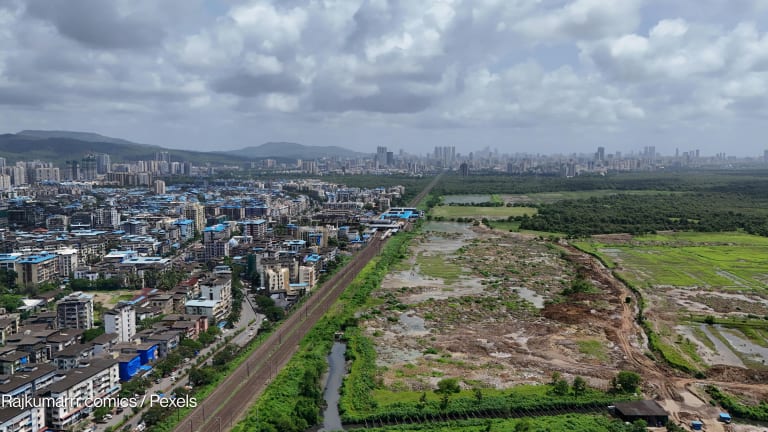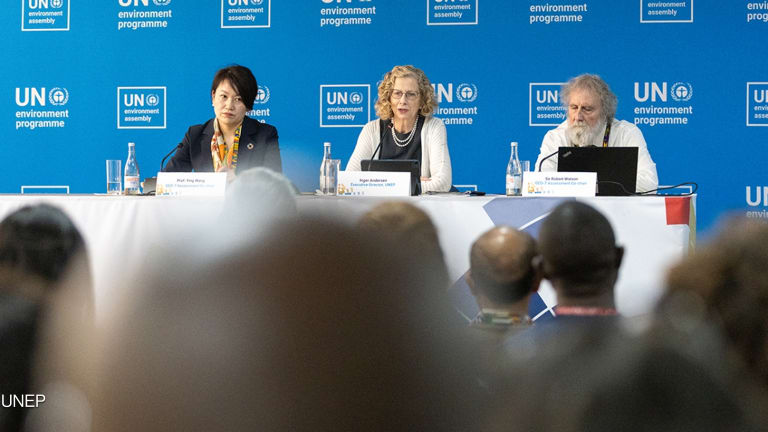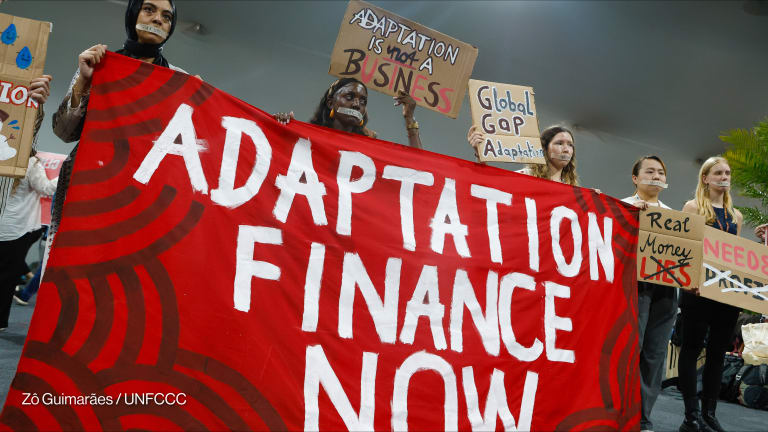In Bangkok, climate campaigners warn against the private sector 'silver bullet'

BANGKOK — Environment and energy delegates from around the world continue to parse over the Paris Agreement on climate change text this week — and experts hope to see far more varied financial tools brought to the negotiation table as a result.
Developed countries tout the insurance sector as a critical piece in the global effort to help developing countries cope with climate change-induced weather, which destroys crops and displaces communities every year. But the hyperfocus on insurance as the solution to climate impacts is too narrow, and discounts a host of other options to address the issue, explained Julie-Anne Richards, climate expert and co-author of new report “Not a Silver Bullet.”
New Paris climate agreement proposal would 'let rich countries off the hook,' activists say
A new submission from the United States, Japan, and Australia has cast doubt that Bangkok negotiations will deliver the clear, streamlined Paris accord text U.N. leaders have been calling for this week.
The theme of “loss and damage” — separate from adaptation and mitigation — from climate impacts has been alternately discussed and walked back from during years of negotiations leading up to the Paris accord, but it is still a key issue under discussion at the United Nations climate talks in Bangkok. Small island states and climate-vulnerable countries are demanding a clear financial and technical package to help them cope with future extreme events.
Developed country governments have promised to mobilize $100 billion per year in climate finance by 2020 to help developing countries cope with climate-induced weather. But activists in Bangkok are still asking where the money is and how it will be delivered. A general unwillingness on the part of developed nations to discuss financial contribution in detail — let alone loss and damage specifically — is undercutting the meeting’s progress, climate campaigners told Devex.
“Insurance and [carbon] market mechanisms — it's the same idea. It's like ‘let's create a private sector solution to this crisis so we can wash our hands of it and continue doing what we want to do,’” said Jesse Bragg, media director for Corporate Accountability, an advocacy group working to bar the fossil fuel industry from climate negotiations.
Developed countries are already contributing money to address loss and damage, although “in all but a few cases, the money they're spending is on climate insurance,” Richards told Devex.
The report points to Malawi’s experience in 2015, of a once-in-500-years flood followed by devastating drought. The Malawi government had purchased sovereign-level drought insurance from African Union insurer African Risk Capacity for a premium of $4.7 million — but incorrect modeling about the way Malawian farmers grew their crops led to a nine-month delay in payout to address their state of emergency. In many cases, the singular focus on insurance is a distraction from other viable solutions, Richards said.
“There are plenty of other options that you would choose that have better cost-benefit return,” she added. “You might choose to improve your social safety net in Malawi. And that would be a good option for increasing people's resilience.”
In 2017, Hurricane Maria devastated the West Indies island of Dominica, with total damages and losses estimated at $1.37 billion, according to the report. Dominica immediately received a $20 million payout from multicountry risk pool Caribbean Catastrophe Risk Insurance Facility. But insurance provided just 1.5 percent of the cost, with a further 2 percent coming from humanitarian aid and 19 percent of longer term reconstruction costs coming from grants and loans from other countries. The rest falls to the low-income country itself — one whose emission contribution to climate change is miniscule.
This is a troubling example of a case where doubling or even tripling insurance coverage would still only scratch the surface of the loss and damage associated with climate change, Richards said.
“There are plenty of other options that you would choose that have better cost-benefit return.”
— Julie-Anne Richards, climate expert and co-author of “Not a Silver Bullet”Conversely, it is the public sector’s underwriting of insurance schemes and provision of emergency assistance that plays a greater role in addressing catastrophe in countries such as the United States, according to the report: “The U.S. and other developed countries should acknowledge that the same will be necessary for developing countries,” it states.
Aside from country-owned responses that include providing payments at household or individual levels and focusing on livelihood interventions, another option would be to create a climate damages tax. A tax on the extraction of fossil fuels could be pooled into an international “loss and damage solidarity fund” accessible to developing countries facing severe weather such as hurricanes and typhoons as well as slow-onset disasters like droughts.
Reducing climate emissions and ensuring sufficient adaptation finance from rich countries to vulnerable countries is essential to keep loss and damage to a minimum. And while climate insurance can and does work in certain instances, the problem with the current focus is that it shifts responsibility to vulnerable countries to pay for insurance premiums, Richards said.
“Developed countries are saying ‘climate insurance, this is the option, the only option that we're offering to you’ and developing countries don't get to choose for themselves what they think is going to work,” Richards said. “This is doubling down on the climate injustice of poor and vulnerable countries.”
Search for articles
Most Read
- 1
- 2
- 3
- 4
- 5








